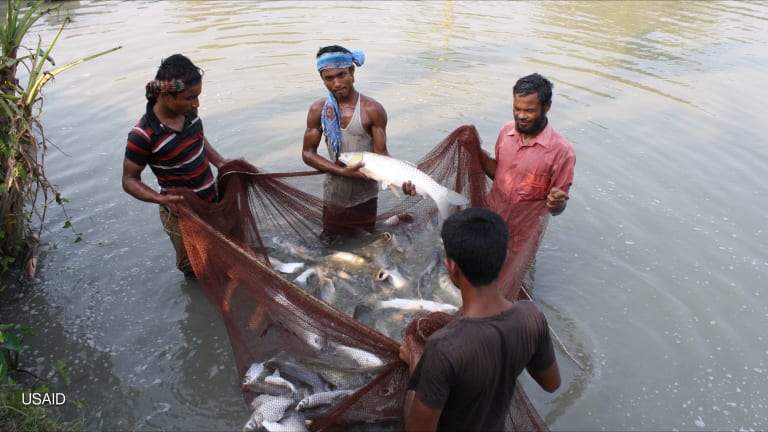
Import financing is urgently needed to help avert the worst of the global food crisis, the Food and Agriculture Organization said Tuesday.
Sixty-two low- to upper-middle-income countries are eligible for an FAO-proposed Food Import Financing Facility to help make food more affordable, FAO Chief Economist Máximo Torero said at an online event at the Center for Global Development Tuesday. FAO suggests the facility be housed at the International Monetary Fund.
The most vulnerable countries — with a total population of 1.78 billion people — have seen their food import bills increase by approximately $26.4 billion just this year, Torero said.
“For the most vulnerable countries, it means that the global food import bill is at record levels — or was at record levels,” he said.
“This means that they will be able to import less and this will have an impact, especially on the poorest countries, which will have two effects: the price effect, plus the devaluation of the currency effect,” Torero said, adding there could be a reduction in the volume and quality of food consumed.
While some nations, such as Egypt and Lebanon, already receive help from multilateral development banks, Torero said there needs to be a more concerted international effort to support the entire group of vulnerable countries. The facility would be set up within the existing framework of IMF, making it easy to scale and shift the loans as countries’ needs changed.
Because the current crisis is caused by affordability rather than availability — enough food exists globally to feed the population, but not everyone can afford what they need. The facility would help countries that cannot pay their current import bills.
It could also help countries maintain a decent diet, Torero said, because as food prices rise, people shift their consumption to be more calorie, rather than nutrition, focused.
FAO has the data to determine which countries are most at risk and could provide technical assistance to IMF, Torero said, highlighting that food inflation can lead to social problems.
“If you get into social unrest in these countries then … it will be even a higher cost,” he said. “Remember, we’re talking about the food bill. It’s not only wheat, maize, and sunflower, it’s the whole food bill that has gone up.”
“If we give them a loan to pay two years later, we’re talking about a $1 billion subsidy, which is nothing,” Torero continued. “But this will at least help them to cope for a short period of time.”
FAO Director-General Qu Dongyu presented the financing facility to G-20 finance ministers in July, and the U.N. agency has not yet received a response from IMF, Torero said.
IMF did not respond to a request for comment about the financing facility or when a decision may be made.
“For us, it’s something that needs to move extremely fast because [despite] that the prices are going down, they are [still] high and these countries are really facing challenges and you don’t want to end in situations that could create social unrest,” Torero said.
Torero raised concern that coordination between international organizations trying to find a solution to spiking food, fuel, and fertilizer prices is not working. There is a “huge coordination failure,” he said. Agencies that specialize in one area have focused on another area and therefore “create a problem rather than create a solution.”
He also highlighted the knock-on effects of high fertilizer prices on food availability. If the prices of the agricultural input and the natural gas needed to produce it continue to climb, consumers could benefit from lower food prices as grain starts making its way out of Ukraine. But this could lead farmers to shift their production.
Rice — which is not a major export from Ukraine — is particularly concerning, Torero said. The high cost of fertilizer is making the crop — the biggest import for sub-Saharan Africa — less profitable for farmers, so they may shift to another crop with better margins as food prices come down. As of yet, there is no access issue with rice, Torero said.
”We need to be very careful with the rice commodity,” Torero said. “The linkage between natural gas and fertilizers — that's what worries us the most because that is affecting the next planting season. Why? Because if nitrogen prices continue to go up, natural gas is going up, so food prices are now at the levels before the war but natural gas is still going up.”
The key resolution to the agricultural sector's issues is increasing resilience, Torero said, so that future events such as war or climate change, which affect large producers of global commodities, do not have the power to shock the entire food system.
“The problem is the way the world operates right now is that you have very few key exporting countries of cereals … and unless we increase the number of big countries exporting these commodities, we won’t be able to diversify,” he said. “We need to think in agriculture in a world of risk and uncertainty.”









